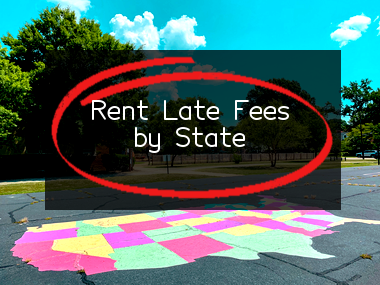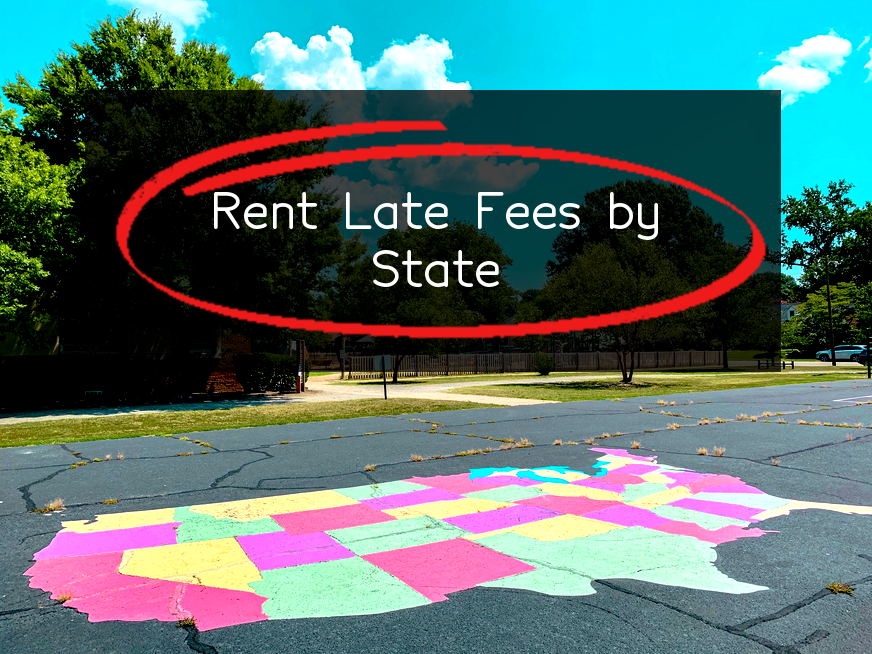It is important to note that late fees on rent payments may vary from state to state and are usually stated in the lease agreement. It is advisable for both landlords and tenants to review the lease agreement and familiarize themselves with the late fees policy before signing any rental contract. Additionally, tenants should prioritize paying rent on time to avoid late fees and possible consequences such as eviction.
Late Rent Fees by State: Interactive Map
The fees vary from state to state and can range from a flat dollar amount to a percentage of the rent owed.
Some states have laws regulating late fees. For example, in California, landlords are limited to charging a fixed percentage of the monthly rent and cannot charge more than 5% of the monthly rent if the tenant is late by five days or more.
In other states, such as Texas, there are no limits on the amount that landlords can charge for late rent fees. However, the fee must be included in the lease agreement and cannot be changed during the lease term.
It's important for tenants to be aware of these laws and regulations in their state, and to read their lease agreements carefully to understand their rights and responsibilities. In case of any confusion or conflict, tenants can seek legal assistance.
Late Fees for Rent Can?t Be ?Unreasonable?
Late fees for rent cannot be "unreasonable" because they must be proportional to the actual costs the landlord incurs due to the late payment. These costs may include administrative expenses, such as mailing a late notice, or opportunity costs, such as missed rental income. However, if the late fee is excessively high and in no way related to the landlord's actual expenses, it may be deemed "unreasonable" and may be unenforceable or subject to litigation. Additionally, some jurisdictions have laws or regulations that limit the amount of late fees that landlords can charge, further ensuring that they are reasonable and fair.
Why Should Landlords Charge Late Rent Fees?
I could provide some points for both sides of the argument:
Reasons for charging late rent fees:
- 1It compensates for the landlord's inconvenience: If tenants don't pay their rent on time, landlords might have to deal with financial strain to make mortgage or other payments.
- 2It represents an opportunity cost to the landlord: Late rent payments can cause a landlord to miss other financial opportunities that would have been available if they had received their payment on time.
- 3It helps tenants to be responsible: Charging late fees could help remind tenants to pay on time, and also help avoid unnecessary evictions.
- 4A provision in the lease agreement: The lease agreement between the tenant and landlord might include provisions for late or missed payments.
Reasons against charging late rent fees:
- 1It could be seen as a penalty: Tenants who face financial difficulties may feel unjustly penalized by late rent fees, which makes it more difficult to pay rent in the future.
- 2It may encourage tenants to move: Some tenants may choose to move out if they receive high late fees, which could lead to increased vacancies.
- 3It may discourage tenants from reporting issues: Tenants who fear a high fee may be more likely to avoid reporting maintenance or other issues to their landlord.
- 4Legal limits on late fees: In some places, laws limit how much landlords can charge in late fees.
Overall, the decision to charge late rent fees is a matter of personal business practice and observation of what is permitted by the laws in the locality.
How Do Landlords Enforce Late Rent Fees?
When a tenant is unable to pay their rent on time, a landlord may choose to assess late rent fees as a penalty. The fees are usually outlined in the lease agreement signed between the tenant and the landlord. Here are some ways landlords can enforce late rent fees:
- 1Review the Lease Agreement: If a tenant fails to pay rent on the due date, the landlord needs to check their lease agreement to confirm whether or not there is a late fee charged on unpaid rent. If there is a provision for late fees, the landlord should charge the tenant the amount specified in the lease.
- 2Serve a Notice to Pay or Quit: A landlord may serve a tenant with a notice to pay or quit, which gives the tenant a certain number of days to pay the rent or vacate the property. This notice typically includes the unpaid rent amount, along with any late fees and penalties.
- 3Pursue Legal Action: If a tenant consistently fails to pay rent on time, the landlord may choose to pursue legal action to recover unpaid rent. This can include filing a lawsuit or beginning eviction proceedings. The landlord may also pursue collections through a debt collection agency or by selling the unpaid debt to a collections company.
- 4Withhold Security Deposit: If a tenant moves out without paying late fees or unpaid rent, the landlord may withhold a portion of the security deposit to recover the unpaid amount. However, landlords must follow state laws regarding withholding security deposits.
Overall, landlords should be clear about the late fees they charge and the consequences of not paying rent on time. It's important for landlords to follow state laws and their lease agreements when enforcing late rent fees.
Late Fees for Rent: State Law Summaries
State laws on late fees for rent vary widely. Some states have no laws regulating late fees, while others have specific regulations on the maximum amount of late fees that can be charged, when they can be charged, and how they can be enforced.
In general, states that regulate late fees for rent typically require landlords to provide tenants with written notice of late fees prior to charging them. Most states also have limits on the amount that can be charged usually a percentage of the rent or a fixed dollar amount per day.
Some states also require landlords to give tenants a grace period before charging late fees, and others prohibit landlords from charging late fees if the tenant's rent is only a few days late. Some states allow tenants to challenge excessive late fees or fees charged in bad faith through legal recourse.
It's important for landlords and tenants to be aware of their state's laws regulating late fees for rent and to follow them closely to avoid potential legal issues.
Just one more thing: if you liked the article, please like us on social media and share this article with friends.



